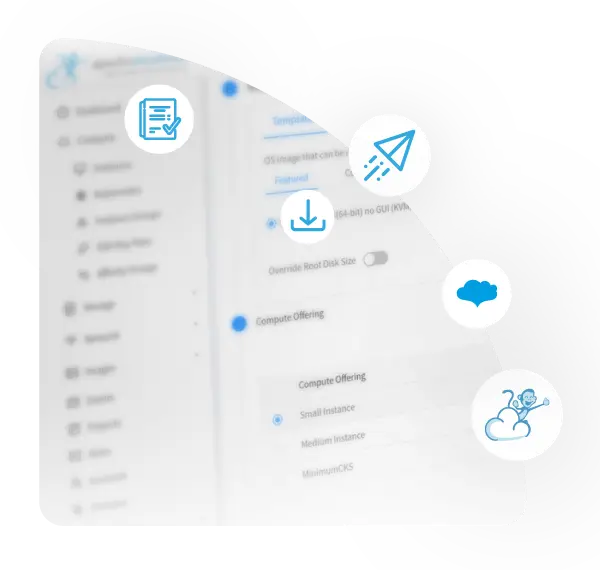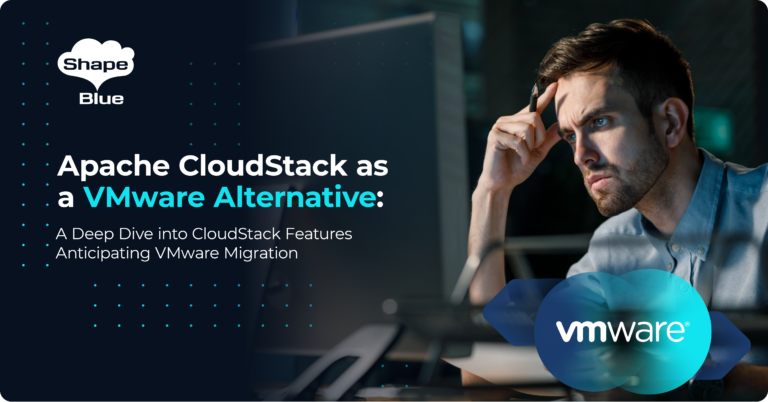ShapeBlue Packages
ShapeBlue builds and hosts Apache CloudStack noredist and customer support-patch repositories for APT (Ubuntu/Debian) and YUM (RHEL/CentOS) based distributions, and Apache CloudStack SystemVM templates

Start by selecting the major CloudStack version. Without pinning on a minor version, you’ll install the latest minor release using the repository.
NOTE: Our current production supported major versions of Cloudstack are 4.17, 4.18 and 4.19.
Documentation and Links for Apache CloudStack 4.19 (4.19.0.0)

Configuring Repository for Debian-based platforms
Import our gpg release key: (Key ID 584DF93F, Key fingerprint = 7203 0CA1 18C1 A275 68B1 37C4 BDF0 E176 584D F93F)
mkdir -p /etc/apt/keyrings
wget -O- http://packages.shapeblue.com/release.asc | gpg --dearmor | sudo tee /etc/apt/keyrings/cloudstack.gpg > /dev/null
Add the following to your /etc/apt/sources.list.d/cloudstack.list to enable the repository (replace 4.19 with the preferred version):
deb [signed-by=/etc/apt/keyrings/cloudstack.gpg] http://packages.shapeblue.com/cloudstack/upstream/debian/4.19 /
You may now install any of the available CloudStack packages, for example:sudo apt-get update && sudo apt-get install cloudstack-management cloudstack-usage cloudstack-agent
Configuring Repository for RPM-based platforms
Import our gpg release key: (Key ID 584DF93F, Key fingerprint = 7203 0CA1 18C1 A275 68B1 37C4 BDF0 E176 584D F93F)rpm --import http://packages.shapeblue.com/release.asc
For EL7 (CentOS7/RHEL7), add the following to your /etc/yum.repos.d/cloudstack.repo (replace 4.19 with the preferred version):[cloudstack-4.18]
name=cloudstack
baseurl=http://packages.shapeblue.com/cloudstack/upstream/el7/4.19
enabled=1
gpgcheck=1
gpgkey=http://packages.shapeblue.com/release.asc
For EL8 (Alma Linux8/RockyLinux 8/RHEL8), add the following to your /etc/yum.repos.d/cloudstack.repo (replace 4.19 with the preferred version):
[cloudstack-4.18]
name=cloudstack
baseurl=http://packages.shapeblue.com/cloudstack/upstream/el8/4.19
enabled=1
gpgcheck=1
gpgkey=http://packages.shapeblue.com/release.asc
For EL9 (AlmaLinux9/RockyLinux9/RHEL9), add the following to your /etc/yum.repos.d/cloudstack.repo (replace 4.19 with the preferred version):
[cloudstack-4.18]
name=cloudstack
baseurl=http://packages.shapeblue.com/cloudstack/upstream/el9/4.19
enabled=1
gpgcheck=1
gpgkey=http://packages.shapeblue.com/release.asc
For openSUSE 15, add the following to your /etc/zypp/repos.d/cloudstack.repo (replace 4.19 with the preferred version):
[cloudstack-4.18]
name=cloudstack
baseurl=http://packages.shapeblue.com/cloudstack/upstream/suse15/4.19
enabled=1
gpgcheck=0
You may now install any of the available CloudStack packages, for example:
yum install cloudstack-management cloudstack-usage cloudstack-agent
Using SystemVM templates
License and Disclaimer
The CloudStack packages repository is managed and maintained by ShapeBlue, and released under Apache License 2.0.
Copyright 2014-2024 ShapeBlue Ltd.
These files are licensed under the Apache License, Version 2.0 (the “License”); you may not use these files except in compliance with the License. You may obtain a copy of the License at:
https://www.apache.org/licenses/LICENSE-2.0
Unless required by applicable law or agreed to in writing, software distributed under the License is distributed on an “AS IS” BASIS, WITHOUT WARRANTIES OR CONDITIONS OF ANY KIND, either express or implied. See the License for the specific language governing permissions and limitations under the License.
Apache CloudStack PoC Guide
This POC guide gives you all the guidance you need to perform a successful Proof of Concept of Apache CloudStack.
By following this guide, you will be prepared for what to expect from the technology and how to move into production. The guide gives detailed configuration information. At the end of this PoC, you will have a highly available, reliable and flexible CloudStack-powered cloud.


